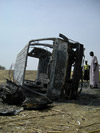
If you have read any of Enough’s recent analyses on Chad, you know by now that the brutally repressive Chadian government (led by desert rebel commando turned president Idriss Déby) is prone to spending millions of dollars on arms instead of social services and then leaving its impoverished citizens to fend for themselves. The latest sobering example of this trend is the government’s unexpected announcement last week of a complete ban on the use of charcoal, which the government said is intended to curb desertification in the arid Sahel region of Central and West Africa. Efforts to combat the effects of climate change throughout Africa are much needed, but a Chadian civil society leader said the ill-conceived ban has created “explosive” conditions because nearly the entire Chadian population relies on charcoal as their sole source of household fuel. At a recent press conference, while panic and protests raged in N’Djamena, a reporter suggested the government had made a mistake in not preparing the public for this drastic measure; a government official responded “It is a gaffe; to err is human.”
The Chadian government’s poor judgment in implementing this ban is emblematic of the country’s long-running internal political crisis and the government’s general lack of legitimacy. As my colleague Colin recently argued, the international community needs to take a new approach to Chad aimed at developing of a practical roadmap toward lasting stability. This process must start with the recognition that the spill over into Chad of Darfur’s crisis is just one of several cancers that are plaguing Chad. For some astute analysis of the links between climate change and conflict, plus breaking news on “today’s new security threats,” check out the Wilson Center’s excellent New Security Beat blog.

